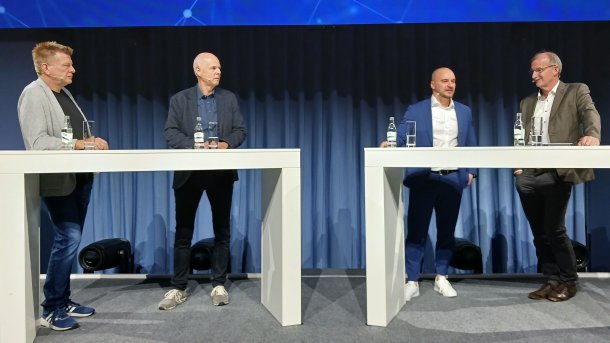Digital expert: Administration needs a "thoroughly algorithmized system"
Bizer from IT administration service provider Dataport believes that more automation and AI are essential in the public sector. Elster is at the forefront here.

At the annual congress of cloud provider Ionos in Berlin: Achim Weiß, Harald Joos, Holger Lehmann and Johann Bizer (from left to right)
(Image: Stefan Krempl)
In view of the shortage of skilled workers, particularly in public administration, and other challenges, Johann Bizer, head of the northern German IT administration service provider Dataport, believes that comprehensive digitalization of the sector is necessary. At the latest when citizens no longer receive administrative services, "you need a thoroughly algorithmized system", emphasized the lawyer on Thursday at the annual congress of the Montabaur-based cloud provider Ionos in Berlin. Replacing human services with program routines is crucial: "Algorithmization plays a major role." This is largely about automation, one area of which is the use of artificial intelligence (AI).
According to Bizer, Dataport is in the process of rolling out corresponding services as "administration-as-a-service" with a corresponding price tag. "It will cost so many millions," he said, adding that those responsible would have to plan for this. The legal expert was convinced: "This can be done nationwide." This principle is already being used to some extent with the Elster electronic tax return: "Only cases are sorted out where risk management says: you have to take a look." The entire process already has a "very high degree of algorithmization". Bizer explained to heise online: The system automatically checks for anomalies, especially the plausibility of the VAT return.
Another example is the technology behind speed cameras, the insider explained: A police officer usually only stands next to it pro forma, otherwise everything from the measurement and license plate recognition to the dispatch of letters and the monitoring of incoming payments runs automatically.
Lack of focus on the "real racetrack"
At the summit, Bizer recalled a dispute between the FDP and the Greens about excessive bureaucratization due to CO2 measurement requirements. The Liberals had feared additional reporting obligations for companies. However, the administrative manager explained that this should not generally involve filling out forms. Instead, sensors should be installed that automatically measure CO2 emissions and report them online. In principle, these topics should be brought down to the level of state secretaries, but they should still be placed above the level of civil servants. This is because politicians often lack a focus on the "real race track". This lies less in technology and more in organizational and process change. State secretaries should build fewer individual AI lighthouses and do more to "ensure uniform IT".
Videos by heise
On the other hand, there is no point in waiting for committees such as the IT Planning Council to provide a unanimous solution for everyone, warned Harald Joos, Cloud Officer at Deutsche Rentenversicherung Bund (DRV). Some wanted Microsoft Teams, he said. Others said: "Over my dead body." However, politicians and the administration should make both possible. "We won't be able to do without US solutions," said the former IT officer of the Federal Finance Administration. Black-and-white discussions are useless. This also applies to the question of having your own data center or moving to the cloud: "It depends on performance."
"We have to bundle demand," was Joos' watchword. This is the only way for German and European companies to catch up in the cloud sector. For many companies and authorities, "the local offerings are sufficient". The DRV is trying to "bring in several providers via large tenders" and create simpler procurement channels for German solutions. One thing is clear: a hospital that still keeps its server in its own basement "will be hacked tomorrow".
Data pools and earmarking
It used to be said that "everything from Microsoft is great", reported Holger Lehmann, spokesperson for the ITZBund information technology center. When it came to cloud solutions, people often "ended up" with Amazon's AWS. In the meantime, the demand for digital sovereignty has increased. In addition, the General Data Protection Regulation (GDPR) and the "Schrems ruling" mean that the administration now often has "compliance issues" with a "very tight corset". The specialist authorities discovered chatbots during the coronavirus pandemic and are currently "very busy with AI". However, the "purpose limitation under data protection law" stands in the way of this.
"We are investing millions to seal off data pools from each other," explained Lehmann with regard to the GDPR. In business, however, it is preached that all available bits and bytes should be brought together wherever possible. "Political decisions are needed here," emphasized the insider. In principle, the "transparent citizen" is possible with instruments such as data retention. The question is whether this is actually wanted.
Better manage sensitive AI solutions yourself
According to Bizer, Dataport offers on-premises AI applications "where a lot of training is required", i.e. under its own responsibility on its own or rented hardware and software. This applies to a large contract creation project, for example, which is "highly sensitive". This involves processing contract data, for example from the police. Dataport purchases applications with low risks anyway. Everything that has to do with summarizing texts, writing speeches or pure data management runs as "AI-as-a-Service". There may be some blurring between areas, but "we'll fight through that".
Ionos CEO Achim Weiß came out as an "absolute fan of data protection". "But it is sometimes exaggerated," he qualified. According to him, "99 percent of European clouds are all in order" and "the entire administration could be packed onto them". However, the countries would have to agree on individual processes that solution providers could then develop as a priority, including AI. Instead, there is already a catch if the building application can be uploaded digitally, but is printed out again "at the back". Weiß recommended consolidating applications at the top level, but remaining "in the European world" at the bottom.
(akn)